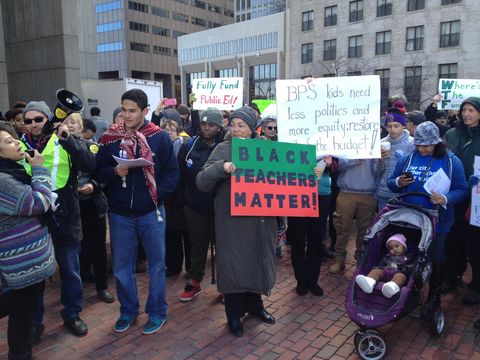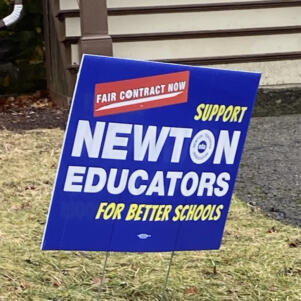School funding needs put in focus by State House rally
By State House News Service | February 17, 2016, 17:32 EST
 Members of Boston Education Justice Alliance led demonstrations at City Hall and the State House Wednesday, urging officials to increase public school funding. (State House News Service photo)
Members of Boston Education Justice Alliance led demonstrations at City Hall and the State House Wednesday, urging officials to increase public school funding. (State House News Service photo) BOSTON – About 200 students, teachers, parents and community members unhappy with funding levels for Boston Public Schools made their presence known Wednesday at the State House and Boston City Hall, delivering a petition with more than 3,700 signatures to Gov. Charlie Baker and Mayor Marty Walsh amid loud chanting.
Led by the Boston Education Justice Alliance (BEJA), the group first focused their attention on City Hall and Mayor Walsh’s education budgets. Rallying on City Hall Plaza, the group cited a letter from Boston Public Schools Superintendent Tommy Chang in which he wrote that the school system faces a $50 million shortfall, though the mayor’s office said that figure is no longer accurate.
“What does it say about how our city and state officials value public education when the BPS budget is cut by $50 million ($140 million over the past three years) and General Electric is given $150 million in tax breaks?” Marlena Rose, coordinator of BEJA, said in a statement.
City Hall said the $50 million shortfall figure was based on outdated information and did not take into consideration an increased appropriation. The BPS budget is not being cut at all, the mayor’s office said, and instead is projected to increase by $13.5 million for the next fiscal year.
“Mayor Walsh has increased funding for Boston Public Schools by nearly $90 million since he took office, including an increase of $13.5 million for the upcoming school year, despite stagnant state education aid,” Laura Oggeri, a Walsh spokesperson, said in a statement. “The increased appropriation in his first two years was more than the increase of all other city departmental appropriations combined.”
At both City Hall and the State House, BEJA supporters chanted things like “money for our schools and education, not for mass incarceration” and “Cut back? Fight back!” as they gave aides to Walsh and Baker copies of a petition signed online by more than 3,700 people urging increased educational funding.
The rallies come after some local officials, Democratic members of the Legislature and unions have criticized Gov. Charlie Baker’s approach to education, particularly his focus on charter schools. The governor, who has filed legislation seeking to allow the authorization of up to 12 new charter schools per year, spoke in support of raising the cap Tuesday for the second time since Friday, when he joined charter proponents for the launch of a new information campaign.
“The administration’s public focus is overwhelmingly on charter schools, and while our excellent vocational schools have also received your attention, the majority of public school students are not significantly helped by this budget,” King Phillip Regional School Committee member Patrick Francomano told the governor during a meeting of the Local Government Advisory Commission last week.
Baker’s budget proposal for next year would increase local Chapter 70 education funding by 1.6 percent, despite saying on the campaign trail that he would increase local aid — which includes Chapter 70 money — at the same rate as state tax revenues, which are projected to grow by 4.3 percent.
If Chapter 70 aid grew at a 4.3 percent clip, it would increase next fiscal year by $194 million, rather than the $72.1 million increase recommended in Baker’s budget. The governor also recommended a $20.5 million increase in reimbursements to public school districts who lose students who choose public charter schools.
“The governor did make a campaign promise to fund education, local aid to education as well as general local aid, apace with growth in state revenues, which as you know would have been a 4.3 percent increase,” Sen. Sonia Chang-Diaz, a Jamaica Plain Democrat and the Senate chairwoman of the Education Committee, said last month. “So a 1.6 percent increase in education aid to localities is a big short on that promise, and I will say unabashedly I find that very disappointing.”
In a statement, the Baker administration said it has proposed the greatest level of aid to schools and is committed to ensuring that all Massachusetts students receive a high-quality education.
“This year, the Baker-Polito Administration was pleased to propose a budget that continues reducing the inherited structural deficit of over a billion dollars without raising taxes or fees, while investing the highest amount of direct aid to local schools, including a $72 million increase in Chapter 70 funding and additional $20 million in charter school reimbursements,” Baker Press Secretary Lizzy Guyton said in an email. “The administration believes that every child in the Commonwealth deserves the opportunity to access high-quality education regardless of their zip code or background.”
Walsh, too, has proposed increased funding for public schools in his budget proposals, but critics contend the increases would fail to keep pace with inflation and rising costs, forcing schools to make cuts.
“The budget has gone up every year since 1630 in Boston, but a $13.5 million increase on an over $1 billion budget…that’s a 1.35 percent increase. Simple math tells us that doesn’t even cover inflation, which is 3 percent,” Boston City Councilor Tito Jackson said outside City Hall. “Tell me how the $13.5 million covers at least giving our young people the same education the received last year. The car is in reverse. We should at least be moving forward and that is going to require investment.”
Jackson, who said he stands “steadfastly” against raising the cap on charter schools, said the expansion of charter schools would contribute to further inequity in the city and in the state.
“The charter cap this year means that we received $211 million. $104 million went to 8,100 charter school students and $107 million is being split by 57,000 Boston Public Schools students,” Jackson said. “That math doesn’t work and it is unsustainable for the Boston Public Schools.”
Valerie Bonds, a retired BPS teacher, said Walsh and Baker, “need to understand that public schools provide services for all students, charter schools provide services for some students.”
Also Wednesday, economist-members of the editorial board of MassBenchmarks released a report that concluded “there is a clear need for substantial and strategic new investments” in education, among other areas, and that large achievement gaps in the state’s urban communities will “continue to inhibit future economic growth and perpetuate inequality.”
Written by Colin A. Young











